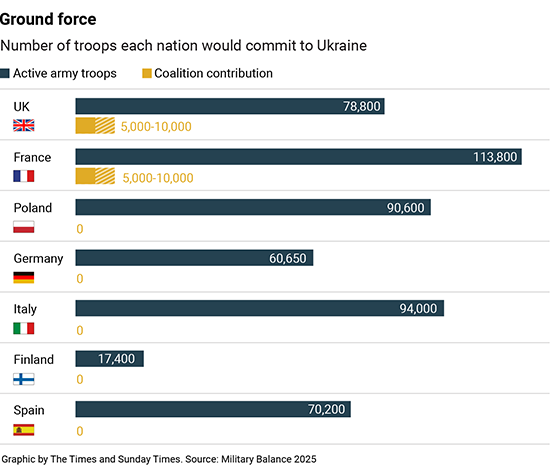
Europe would struggle to collectively muster 25,000 troops to be part of a “deterrence” force in Ukraine because its armies are undermanned and underfunded, sources have disclosed.
‘The Times’ was given a rare insight into conversations between Europe’s defence ministers and military chiefs as they thrashed out plans for a “coalition of the willing” force.
Admiral Sir Tony Radakin, the British chief of the defence staff, is said to have asked his counterparts on the Continent if they could put together a 64,000-strong force to send to the country in the event of a peace deal.
He said Britain would be willing to send up to 10,000 personnel in a meeting earlier this month, it is understood.
However, in subsequent meetings, defence ministers across Europe said there was “no chance” they could reach that number and that even 25,000 would “be a push for a joint effort”, a source privy to discussions in Brussels said.
The Times revealed last week that Britain and France are now more likely to send training troops to western Ukraine instead of a multinational ground force to protect key cities and critical infrastructure amid concerns about the risk involved.
Defence ministers are understood to have raised concerns about Britain’s ambition for a force of 64,000 in a meeting of the “coalition of the willing” on April 10. Discussions then continued in Brussels with a smaller group of defence ministers after the coalition meeting, where allies were more frank.
Close allies made their doubts clear to John Healey, the defence secretary, and pointed out that a force of that size would require a total of 256,000 troops on the ground over two years, accounting for rotations.
Dovile Sakaliene, Lithuania’s defence minister, was said to have told her counterparts: “Russia has 800,000 [troops]. Let me tell you this, if we can’t even raise 64,000 that doesn’t look weak — it is weak.”
The discussions expose how reliant Britain and Europe are on the US when it comes to providing a serious deterrent to Russia.
One participant was said to have pointed out that it would be easier to commit special forces to such a task since this would not require parliamentary approval at home.
Estonia and Finland were reportedly concerned that any deployment would “dilute” their own border defences, and Poland, Spain and Italy made clear they will not commit any soldiers, according to the source.
“Without large populous countries committing [troops], it is a dead end,” added the source. France has said it would commit about the same number as the UK, between 5,000 and 10,000 troops, it is understood.
A second source, privy to discussions in the UK, said that Finland and Germany were also generally against sending ground forces, although it is understood Berlin has not completely ruled out such a move.
The source said: “Once you take those off the table, where’s the army going to come from? With others not there, we would be left exposed.”
The source pointed out that the British Army, which is steadily shrinking, was also suffering from an artillery shortage and problems with “enablers”, such as supply trucks and other equipment they would normally receive from America.
The reluctance among European countries to send ground troops to protect Ukraine is understood to have led to a shift in thinking about what the force would look like should there be a peace deal. There are also concerns about what the rules of engagement would be should Russia attack.
Under the most likely plans, British and French military trainers would be sent to western Ukraine, fulfilling a commitment to put forces inside the country. However, they would not be near the front line, guard key installations or be there to protect Ukrainian troops.
…Military units of Western countries, if deployed in Ukraine, will become legitimate targets for the Russian Armed Forces. This was stated on April 30 by the Secretary of the Security Council of the Russian Federation, Sergei Shoigu.
“I would like to emphasize that it is absolutely unacceptable for Russia to deploy military units of Western states on Ukrainian territory. They will be considered as legitimate targets for the Armed Forces of the Russian Federation,” Izvestia quoted him as saying.
Shoigu said that sending Western military personnel to Ukrainian territory indicates preparations for the occupation of the western part of Ukraine by European countries. He noted that Kiev ignores this possibility.
“We have noticed plans to introduce some pseudo-peacemakers into Ukrainian territory. There are all signs of the impending occupation of the western regions of Ukraine by Europeans,” Sergei Shoigu added.
read more in our Telegram-channel https://t.me/The_International_Affairs

 10:50 03.05.2025 •
10:50 03.05.2025 •






















